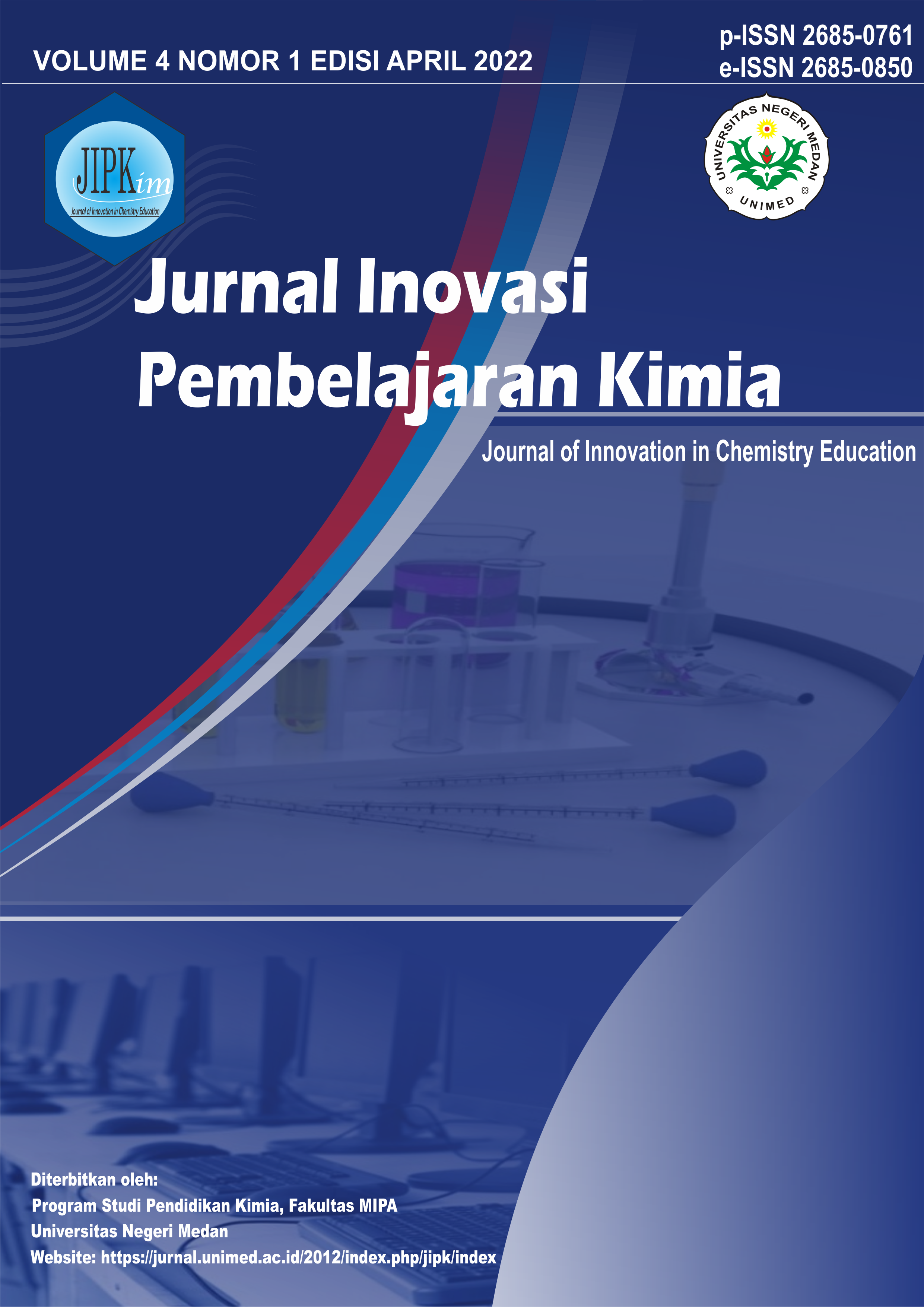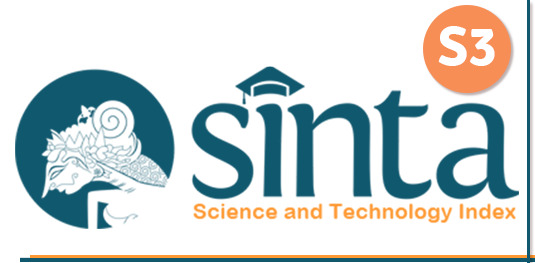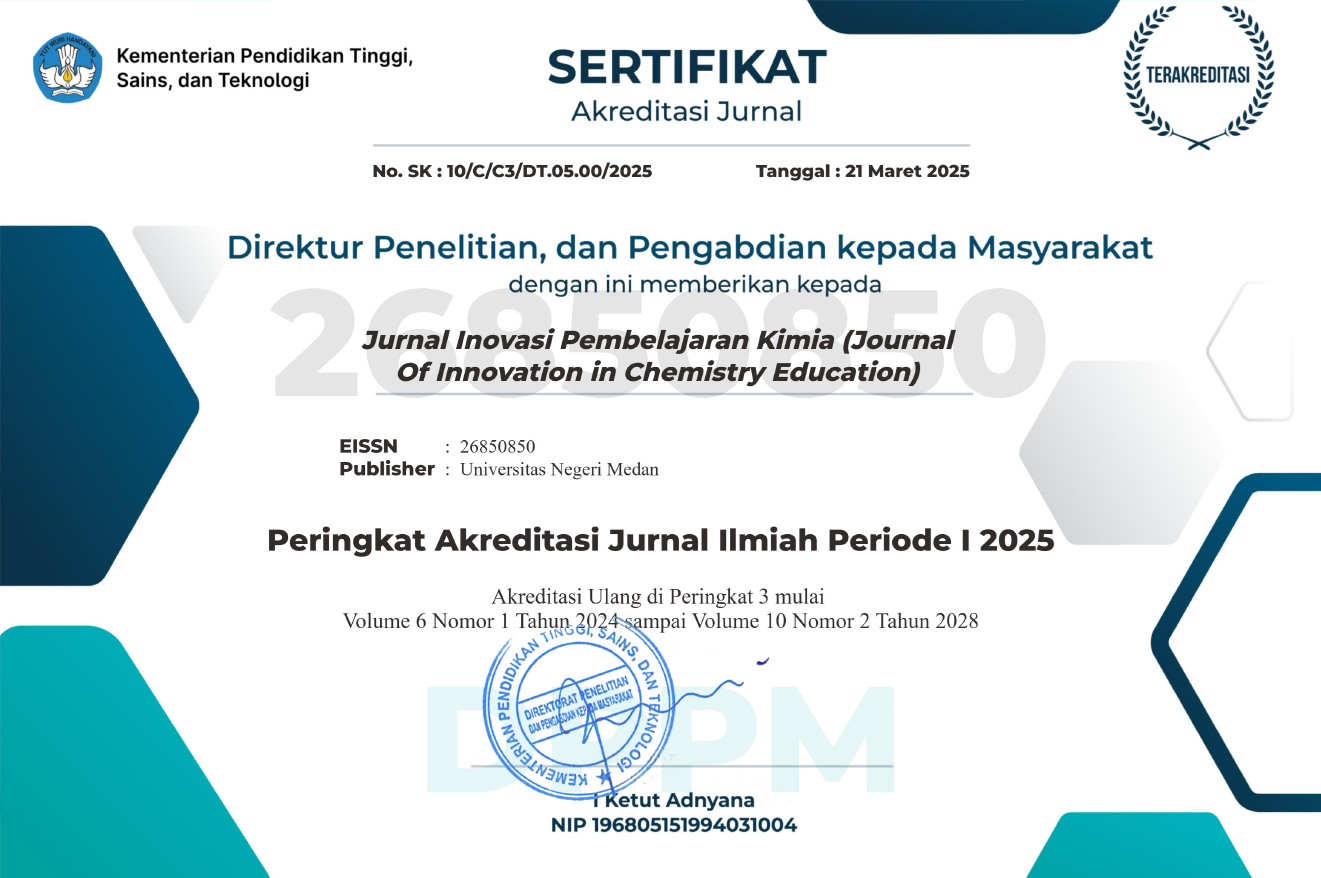Analisis Hubungan Antara Kemampuan Matematika dan Analisis Kimia Terhadap Hasil Belajar Kimia Materi Kesetimbangan Kimia
DOI:
https://doi.org/10.24114/jipk.v4i1.32904Keywords:
Relationship Between Mathematical Ability and Chemical Analysis, Chemical Equilibrium, Learning Outcomes.Abstract
This research was conducted at SMA Negeri 7 Medan on the Analysis of the Relationship Between Mathematical Ability and Chemical Analysis of Students' Chemistry Learning Outcomes in Chemical Equilibrium Material. The population in this study were all students of class XI MIPA SMA Negeri 7 Medan as many as 7 classes. Sampling using purposive sampling technique. The sample taken in this study was class XI MIPA 2. The instruments used consisted of: (1) mathematical ability test instruments in the form of multiple choice questions; (2) chemical analysis ability test instrument in the form of essay questions; (3) the test instrument for chemistry learning outcomes is in the form of multiple choice questions. The results of this study are: (1) there is a linear and significant relationship between mathematical ability and chemistry learning outcomes with a value of Sig(1-tailed) 0.000 <0.05; (2) there is a linear and significant relationship between analytical ability on chemistry learning outcomes with a Sig(1-tailed) value of 0.000 <0.05; (3) there is a significant relationship between mathematical ability and chemical analysis ability on chemistry learning outcomes with a value of Sig(1-tailed) 0.000<0.05.References
Abduhan, R., Mulyani, S., & Utami, B. (2015). Pengaruh Model Pembelajaran Problem Solving Dan Student Teams Achievement Divisions (Stad) Berkombinasi Drill and Practice Dengan Memperhatikan Kemampuan Matematika Terhadap Prestasi Belajar Siswa. Jurnal Pendidikan Kimia (JPK), 4(4), 71“79.
Amarlita, D. M., & Sarfan, E. (2015). Analisis Kemampuan Makroskopis, Mikroskopis dan Simbolik pada Materi Kesetimbangan Kimia. Bimafika, 6, 677“680.
Aprilia, S. (2015). Pembelajaran Kimia Berbasis Masalah (Problem Based Learning) Dengan Menggunakan Laboratorium Real dan Virtual Ditinjau Dari Gaya Belajar Siswa Di SMA Negeri 1 Boja Tahun Pelajaran 2010/2011. Jurnal Profesi Pendidik, 2(2), 40“49.
Aritonang. (2008). Minat dan Motivasi dalam Meningkatkan Hasil Belajar Siswa. Teachers College Record, 1(10), 11“21.
Arnita, F. (2018). Pengaruh Model Pembelajaran Kooperatif Team Assisted Individualization dan Kemampuan Numerik Terhadap Hasil Belajar Siswa Pada MAteri Kesetimbangan Kimia Di MAN 1 Aceh Barat. Skripsi.
Cahyono, T., Masykuri, M., & Ashadi, A. (2016). Kontribusi Kemampuan Numerik Dan Kreativitas Terhadap Prestasi Belajar Siswa Pada Materi Pokok Hidrolisis Kelas XI MIA 1 Dan XI MIA 5 SMA Negeri 2 Karanganyar Tahun Pelajaran 2015/2016. Jurnal Pendidikan Kimia Universitas Sebelas Maret, 5(2), 81“88.
Cholifah, E. N. U., Yamtinah, S., & VH, E. S. (2019). Hubungan Kemampuan Analisis dan Matematika dengan Prestasi Belajar Siswa pada Materi Larutan Penyangga Kelas XI SMA Negeri 4 Surakarta. Jurnal Pendidikan Kimia, 8(2), 179“184. https://doi.org/10.20961/jpkim.v8i2.25340
Daniyati, N. A., & Sugiman. (2015). Hubungan Antara Kemampuan Verbal , Kemampuan Interpersonal , dan Minat Belajar dengan Prestasi Belajar Matematika. Pthagoras : Jurnal Pendidikan Indonesia, 10, 50“60. http://journal.uny.ac.id/index.php/pythagoras%
Diantari, P., Wiarta, W., & Negara, G. A. O. (2015). Pengaruh Model Pembelajaran Problem Based Learning Berbasis Hypnoteaching Terhadap Hasil Belajar Matematika Siswa. Jurnal Mimbar PGSD Universitas Pendidikan Ganesha, 2(1), 1“10.
Dibyantini, R. E., & Azaria, W. (2020). Pengaruh Penerapan Model Pembelajaran Berbasis Masalah Terhadap Kemampuan Generik Sains Siswa Pada Materi Larutan Penyangga. Jurnal Inovasi Pembelajaran Kimia, 2(2), 81“90.
Fassenda, N., & Yonata, B. (2016). Keterampilan Berpikir Menganalisis, Mengevaluasi, dan Mencipta Siswa SMA N 19 Surabaya Pada Materi Kesetimbangan Kimia. 5(1), 19“25.
Fayuddin, Liliasari, & Sabandar, J. (2015). Tingkat Pemahaman Mahasiswa Pendidikan Kimia Pada Beberapa Konsep Dasar Matematik yang Dibutuhkan Untuk Kelancaran Belajar Kimia Kuantitatif. Pendidikan Sains Pascasarjana Universitas Negeri Surabaya, 2(1), 147“153.
Gunantara, Suarjana, & Riastini, N. (2015). Penerapan Strategi Pembelajaran Problem Based Learning Untuk Meningkatkan Kemampuan Pemecahahan Masalah Matematis Siswa. Jurnal Matematika Kreatif-Inovatif, 2(1), 1“10. https://doi.org/10.15294/kreano.v10i2.19671
Hafely, Bey, A., Jazuli, L. O. A., & Sumarna, N. (2019). Pengaruh Model Pembelajaran Problem Based Learning (PBL) Terhadap Kemampuan Komunikasi Matematik Siswa SMP. Jurnal Pendidikan Matematika, 9(2), 194“204. https://doi.org/10.36709/jpm.v9i2.5869
Harahap, A., & Darmana, A. (2020). Pembelajaran PBL Menggunakan Bahan Ajar Terintegrasi Nilai Spiritual untuk Meningkatkan Hasil Belajar dan Sikap Spiritual. Jurnal Inovasi Pembelajaran Kimia, 2(2), 64“70.
Lestari, I. A., Amir, H., & Rohiat, S. (2017). Hubungan Persepsi Siswa Kelas X MIPA di SMA Negeri Se-Kota Bengkulu Tahun Ajaran 2016/2017 tentang Variasi Gaya Mengajar Guru dengan Hasil Belajar Kimia. ALOTROP Jurnal Pendidikan Dan Ilmu Kimia, 1(2), 113“116. https://ejournal.unib.ac.id/index.php/alotropjurnal/article/view/3525
Lubis, S., Sinaga, B., & Mulyono. (2018). The Differences of Mathematical Problem Solving Ability and Motivation of Learning Mathematics Between Students are Given PBL and RME Model Assisted by Geogebra. Journal of Education and Practice, 9(6), 53“59.
Maisaroh, & Rostrieningsih. (2015). Peningkatan Hasil Belajar Siswa Dengan Menggunakan Metode Pembelajaran Active Learning Tipe Quiz Team Pada Mata Pelajaran Keterampilan Dasar Komunikasi Di SMK Negeri 1 Bogor. Jurnal Ekonomi Dan Pendidikan, 8(2), 157“172. https://doi.org/10.21831/jep.v7i2.571
Malahayati, E. N., Corebima, A. D., & Zubaidah, S. (2015). Hubungan Keterampilan Metakognitif dan Kemampuan Berpikir Kritis dengan Hasil Belajar Biologi Siswa SMA dalam Pembelajaran Problem Based Learning (PBL). Jurnal Pendidikan Sains, 3(4), 178“185.
Maskur, R., Sumarno, Rahmawati, Y., Pradana, K., Syazali, M., Septian, A., & Palupi, E. K. (2020). The Effectiveness of Problem Based Learning and Aptitude Treatment Interaction in Improving Mathematical Creative Thinking Skills on Curriculum 2013. European Journal of Educational Research, 9(1), 375“383. https://doi.org/10.12973/eu-jer.9.1.375
Merdekawati, K. (2015). Pengaruh Kemampuan Matematik Terhadap Prestasi Belajar Kimia. Jurnal Inovasi Dan Kewirausahaan, 2(1), 26“31.
Muderawan, I. W., Wiratma, I. G. L., & Nabila, M. Z. (2019). Analisis Faktor-Faktor Penyebab Kesulitan Belajar pada Bidang Studi Akuntansi. Jurnal Pendidikan Kimia Indonesia, 3(1), 17“23. https://doi.org/10.36088/manazhim.v1i1.138
Nainggolan, B., & Mutiah, R. (2020). Pengajaran Materi Kesetimbangan Kimia Menggunakan Pembelajaran Problem Based Learning Disertai Macromedia Flash Hasil Pengembangan. 2(2), 71“80.
Noviani, J., Syahputra, E., & Abdul Murad. (2017). The Effect of Realistic Mathematic Education ( RME ) in Improving Primary School Students ™ Spatial Ability in Subtopic Two Dimension Shape. Journal of Education and Practice, 8(34), 112“126.
Nurhasanah, S., & Sobandi, A. (2016). Minat Belajar Sebagai Determinan Hasil Belajar Siswa (Learning Interest as Determinant Student Learning Outcomes). Jurnal Pendidikan Manajemen Perkantoran, 1(1), 128“135. https://doi.org/10.17509/jpm.v4i1.14958
Panggabean, F. T. M., & Harahap, M. F. (2020). Analisis Problem Based Learning Dan Discovery Learning Menggunakan Macromedia Flash Pada Materi Termokimia. Jurnal Inovasi Pembelajaran Kimia, 2(2), 58“63.
Parida, I., Winarsih, M., Maksum, A., & Adiansha, A. A. (2018). Improving the Ability of Mathematic Communication through the Realistic Mathematic Education Approach ( RME ) at the Student Class Iv. American Journal of Educational Research, 6(8), 1063“1071. https://doi.org/10.12691/education-6-8-1
Purnamawati, H., Ashadi, & Susilowati, E. (2015). Pengaruh Model Pembelajaran Kooperatif Tipe Teams Games Tournament (TGT) dengan Media Kartu dan Ular Tangga Ditinjau Dari Kemampuan Analisis Siswa Terhadap Prestasi Belajar Siswa Pada Materi Pokok Reaksi Redoks Kelas X Semester 2 SMA Muhammadiyah 1 Karang. Jurnal Pendidikan Kimia (JPK), 3(4), 100“108.
Putri, S. K., Hasratuddin, H., & Syahputra, E. (2019). Development of Learning Devices Based on Realistic Mathematics Education to Improve Students™ Spatial Ability and Motivation. International Electronic Journal of Mathematics Education, 14(2), 393“400. https://doi.org/10.29333/iejme/5729
Rasmussen, C., Kwon, O. N., Allen, K., Marrongelle, K., & Burtch, M. (2015). Capitalizing on advances in mathematics and K-12 mathematics education in undergraduate mathematics: An inquiry-oriented approach to differential equations. Asia Pacific Education Review, 7(1), 85“93. https://doi.org/10.1007/BF03036787
Sari, J., Bahar, A., & Handayani, D. (2017). STUDI KOMPARASI ANTARA MODEL PEMBELAJARAN DISCOVERY LEARNING DAN GROUP INVESTIGATION TERHADAP HASIL BELAJAR KIMIA SISWA. ALOTROP Jurnal Pendidikan Dan Ilmu Kimia, 1(1), 60“65.
Sembiring, M. A., Larasati, M. F., & Sapta, A. (2018). Analisa Kinerja Algoritma C.45 Dalam Memprediksi Hasil Belajar. Journal of Science and Social Research, 1(1), 73“79. http://jurnal.goretanpena.com/index.php/JSSR
Sinaga, M., & Silaban, S. (2020). Implementasi Pembelajaran Kontekstual untuk Aktivitas dan Hasil Belajar Kimia Siswa. Jurnal Gagasan Pendidikan Indonesia, 1(1), 33“40. https://doi.org/10.30870/gpi.v1i1.8051
Siregar, W. D., & Simatupang, L. (2020). Pengaruh Model Pembelajaran PBL (Problem Based Learning) Terhadap Aktivitas Dan Hasil Belajar Siswa Pada Materi Asam Basa. Jurnal Inovasi Pembelajaran Kimia, 2(2), 91“96. http://repo.iain-tulungagung.ac.id/id/eprint/10705
Soleh, M. Y., Santosa, S., & Indrowati, M. (2015). Studi Komparasi Penerapan Model Pembelajaran Problem Based Learning dan Inkuiri Terbimbing terhadap Keterampilan Proses Sains Siswa Kelas X SMA Negeri 3 Boyolali. 3(2), 1“11. http://ejournal.kahuripan.ac.id/index.php/TECNOSCIENZA/article/view/26
Suliman, Sarwanto, & Suparmi. (2017). Pendekatan Saintifik Pada Pembelajaran Fisika Dengan Metode Eksperimen dan Demonstrasi Ditinjau Dari Kemampuan Berpikir Abstrak dan Kemampuan Analisis Siswa. Jurnal Inkuiri, 6(1), 21“30.
Sumartono, & Normalina. (2015). Motivasi dan Hasil Belajar Siswa dalam Pembelajaran Matematika dengan Menggunakan Model Pembelajaran Kooperatif Tipe Scramble di SMP. Jurnal Pendidikan Matematika, 3(1), 84“91. https://doi.org/10.20527/edumat.v3i1.638
Suryani, L., Saputro, A., & Martini, K. (2015). Implementasi Model Pembelajaran Problem Posing Dilengkapi LKS Untuk Meningkatkan Kemampuan Analisis Dan Prestasi Belajar Materi Konsep Mol Siswa Kelas X Sma N 8 Surakarta Tahun Pelajaran 2013/2014. Jurnal Pendidikan Kimia, 4(4), 186“192.
Syamsurizal, Haryanto, & Chairani, N. (2015). Pengembangan e-Modul Berbasis Keterampilan P SAINS PADA MATERI KESETIMBANGAN KIMIA Untuk Tingkat SMA. Prosiding SEMIRATA, 655“661.
Udousoro, U. (2011). The Effects of Gender and Mathematics Ability on Academic Performance of Students in Chemistry. African Research Review, 5(4), 201“213. https://doi.org/10.4314/afrrev.v5i4.69277
Wahyuni, A., & Kurniawan, P. (2018). Hubungan Kemampuan Berpikir Kreatif Terhadap Hasil Belajar Mahasiswa. Jurnal Matematika, 17(2), 1“8. https://doi.org/10.29313/jmtm.v17i2.4114
Ware, K., & Rohaeti, E. (2018). Penerapan Model Problem Based Learning dalam Meningkatkan Kemampuan Berpikir Analitis dan Keterampilan Proses Sains Peserta Didik SMA. Jurnal Tadris Kimiya, 3(1), 42“51. https://doi.org/10.15575/jtk.v3i1.2219
Yulianti, E., Rosani, M., & Nuranisa. (2018). Pengaruh Model Pembelajaran Problem Based Learning Terhadap Kemampuan Berfikir Analitis Siswa SMA Negeri 2 Bayuasin 1. Jurnal Swarnabhumi, 3(2), 89“94.













